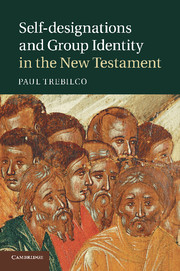Book contents
- Frontmatter
- Contents
- Preface
- Chapter 1 Introduction
- Chapter 2 Brothers and sisters – ἀδελφοί
- Chapter 3 The believers
- Chapter 4 The saints – οἱ ἅγιοι
- Chapter 5 The assembly – ἡ ἐκκλησία
- Chapter 6 Disciples – μαθηταί
- Chapter 7 The Way – ἡ ὁδός
- Chapter 8 ‘Christian’ – Χριστιανός
- Chapter 9 Conclusions
- Bibliography
- Selected author index
- Subject index
- Index of texts
Chapter 6 - Disciples – μαθηταί
Published online by Cambridge University Press: 05 December 2011
- Frontmatter
- Contents
- Preface
- Chapter 1 Introduction
- Chapter 2 Brothers and sisters – ἀδελφοί
- Chapter 3 The believers
- Chapter 4 The saints – οἱ ἅγιοι
- Chapter 5 The assembly – ἡ ἐκκλησία
- Chapter 6 Disciples – μαθηταί
- Chapter 7 The Way – ἡ ὁδός
- Chapter 8 ‘Christian’ – Χριστιανός
- Chapter 9 Conclusions
- Bibliography
- Selected author index
- Subject index
- Index of texts
Summary
Introduction
‘Disciples’, μαθηταί, is used 261 times in the NT. It is by far the most common designation in the Gospels for those who followed Jesus, but it is also used for ‘disciples’ of the Pharisees and of John the Baptist. In this chapter, I will discuss the background of the term, and the way in which Jesus used it and will then discuss its use in Acts and seek to explain why μαθηταί is only found in the NT in the Gospels and Acts. I will then discuss further details of the Evangelists’ use of the term, in the light of its absence from the rest of the NT, and will consider the Evangelists’ strategy in using it in the Gospels. Were they seeking to rehabilitate μαθηταί as a designation and so encouraging their readers to use it of themselves? This will lead to a brief discussion of μαθηταί in the Apostolic Fathers, since this sheds light back on NT usage.
Jesus’ ‘disciples’
It is clear that Jesus attracted a group of people who were attached to him in some clear and definable way and were designated as ‘disciples’ by the Evangelists. This is seen, for example, in Luke 9:59–60: ‘To another he [Jesus] said, “Follow me.” But he said, “Lord, first let me go and bury my father.” But Jesus said to him, “Let the dead bury their own dead; but as for you, go and proclaim the kingdom of God.”’ Jesus’ startling reply meets the criteria of embarrassment. Who in the early churches would create such a saying in which Jesus completely ignores the fundamental duty to bury one's parents? This saying, along with other evidence, indicates Jesus called people to follow him. Dunn notes: ‘That Jesus did gather around himself a group of committed disciples is one of the securest historical facts.’
- Type
- Chapter
- Information
- Self-designations and Group Identity in the New Testament , pp. 208 - 246Publisher: Cambridge University PressPrint publication year: 2011



